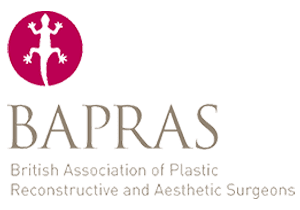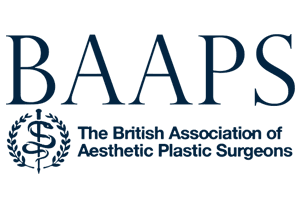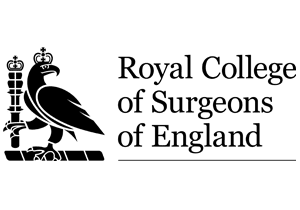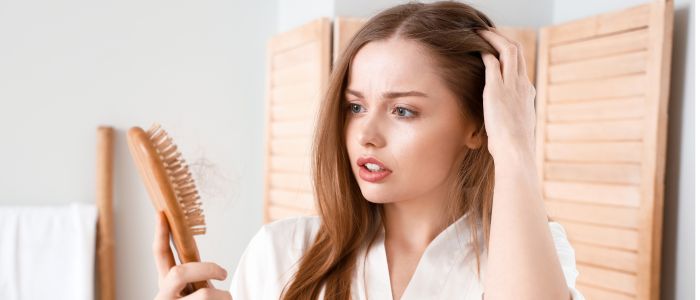
Table of Contents
- Solutions for Scarring Hair Loss
- What Causes Scarring Hair Loss?
- Different Types of Scarring Hair Loss
- Symptoms
- Diagnosis and Treatment Options for Scarring Hair Loss
- Diagnosis
- Treatment Options
- Natural Remedies and Alternative Treatments for Scarring Hair Loss
- Lifestyle Changes to Support Hair Regrowth
- FAQs about Causes and Treatment for Scarring Hair Loss
- Further Reading about Procedures at Cheshire Cosmetic Surgery
Solutions for Scarring Hair Loss
Scarring hair loss, also known as cicatricial alopecia, is a complex and often misunderstood condition that can have a profound impact on an individual’s self-esteem and overall well-being. Unlike typical hair loss, which is usually temporary and reversible, scarring hair loss is characterised by permanent hair follicle destruction, leading to irreversible baldness.
At Cheshire Cosmetic Surgery, Dr Dalia will help you understand the causes of hair loss, associated symptoms and available treatment options.
What Causes Scarring Hair Loss?
It can arise from a variety of underlying causes, including autoimmune disorders, inflammatory conditions, and physical trauma. Here are some of the common factors that contribute to this condition:
- Autoimmune disorders: Certain autoimmune diseases, such as lupus erythematosus, lichen planopilaris, and frontal fibrosing alopecia, can trigger an immune system attack on the hair follicles, leading to inflammation, scarring, and permanent hair loss.
- Inflammatory conditions: Chronic inflammatory skin conditions like folliculitis decalvans, dissecting cellulitis of the scalp, and acne keloidalis nuchae can cause inflammation and subsequent scarring of the hair follicles.
- Physical trauma: Injuries to the scalp, such as burns, radiation therapy, or repeated traction from hairstyles like tight braids or ponytails, can damage the hair follicles and lead to scarring.
- Genetic predisposition: Some forms of scarring hair loss, like certain types of lichen planopilaris, may have a genetic component, making individuals more susceptible to developing the condition.
- Infections: Bacterial or fungal infections of the scalp, if left untreated, can cause inflammation and scarring, leading to permanent hair loss.
It’s important to note that in many cases, the exact cause remains unknown, making it a challenging condition to diagnose and treat effectively.
Different Types of Scarring Hair Loss
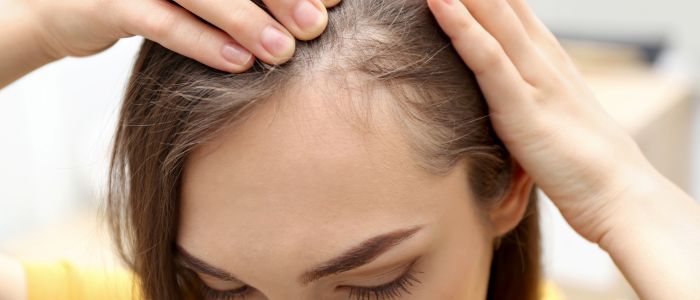
It can manifest in various forms, each with its own unique characteristics and underlying causes. Here are some of the most common types:
- Lichen planopilaris (LPP): This is an autoimmune disorder that primarily affects the scalp, causing inflammation, scarring, and permanent hair loss. LPP can occur in localised patches or diffuse patterns, and it’s more common in women.
- Frontal fibrosing alopecia (FFA): This type of scarring hair loss primarily affects the frontal hairline and eyebrows, causing progressive recession and scarring. FFA is more prevalent in postmenopausal women.
- Folliculitis decalvans: This inflammatory condition is characterised by painful, pus-filled bumps on the scalp that can lead to scarring and permanent hair loss. It’s often associated with bacterial infections.
- Dissecting cellulitis of the scalp: This rare condition involves the formation of abscesses and sinus tracts in the scalp, leading to scarring and hair loss. It’s more common in men and can be associated with underlying medical conditions.
- Acne keloidalis nuchae: This type of scarring hair loss primarily affects the back of the scalp and nape of the neck, causing firm, keloid-like lesions and subsequent hair loss. It’s more common in men of African descent.
- Central centrifugal cicatricial alopecia (CCCA): This form of scarring hair loss typically starts at the vertex (top) of the scalp and spreads outward in a circular pattern. It’s more prevalent in women of African descent.
Symptoms
Early recognition of the symptoms is essential for prompt diagnosis and treatment, as it can help prevent further hair follicle damage and potential scarring. Here are some common symptoms to watch out for:
- Patchy hair loss: One of the earliest signs is the appearance of smooth, bald patches on the scalp, often accompanied by redness, inflammation, or scaling.
- Itching or burning sensation: Many forms are accompanied by an itchy or burning sensation on the affected areas of the scalp, which can be a sign of inflammation.
- Scarring or roughness: As the condition progresses, the affected areas of the scalp may develop a rough, scarred texture, indicating permanent hair follicle damage.
- Pustules or lesions: In some types of scarring hair loss, such as folliculitis decalvans, you may notice the presence of pus-filled bumps or lesions on the scalp.
- Receding hairline or eyebrow thinning: Conditions like frontal fibrosing alopecia can cause progressive recession of the frontal hairline or thinning of the eyebrows.
- Increased shedding: While shedding is a normal part of the hair growth cycle, excessive shedding or thinning of the hair in specific areas can be an early sign of scarring hair loss.
Diagnosis and Treatment Options for Scarring Hair Loss
Diagnosing scarring hair loss can be challenging, as it often requires a combination of clinical evaluation, medical history, and specialised tests. Here’s an overview of the diagnostic process and available treatment options:
Diagnosis
- Physical examination: Dr Dalia will perform a thorough examination of your scalp, hair, and skin, looking for signs of inflammation, scarring, or other abnormalities.
- Medical history: Your dermatologist will ask about your medical history, including any autoimmune disorders, skin conditions, medications, or recent trauma to the scalp.
- Trichoscopy: This non-invasive technique involves using a specialised handheld device or dermatoscope to examine the scalp and hair follicles in greater detail.
- Biopsy: In some cases, a small sample of scalp tissue may be taken (biopsy) for further analysis under a microscope to determine the specific type of scarring hair loss and underlying cause.
- Blood tests: Dr Dalia may order blood tests to check for autoimmune disorders, hormonal imbalances, or other underlying conditions that could be contributing to the hair loss.
Treatment Options
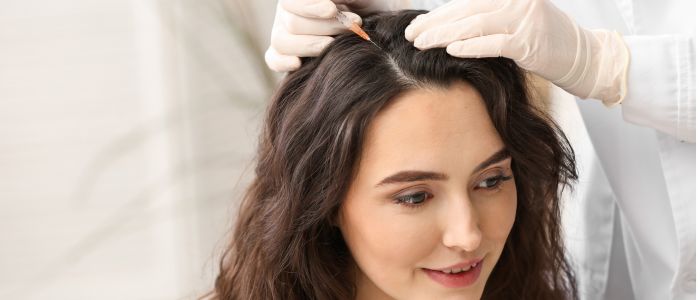
The treatment approach for scarring hair loss depends on the specific type, underlying cause, and severity of the condition. Here are some common treatment options:
- Medications: Depending on the type of scarring hair loss, Dr Dalia may prescribe medications such as corticosteroids, immunosuppressants, or antimicrobials to help reduce inflammation, suppress the immune system, or treat underlying infections.
- Topical treatments: Topical creams, ointments, or solutions containing medications like minoxidil, anthralin, or calcineurin inhibitors may be recommended to promote hair growth or manage inflammation.
- Phototherapy: Exposure to specific wavelengths of light, such as ultraviolet or excimer laser, can help reduce inflammation and promote hair regrowth in certain types of scarring hair loss.
- Surgical procedures: In cases where hair loss is extensive or scarring is severe, surgical procedures like hair transplantation or scalp reduction may be recommended to restore hair growth or improve the appearance of the affected areas.
- Combination therapy: In many cases, a combination of different treatments, such as medications, topical treatments, and phototherapy, may be used to achieve optimal results.
Natural Remedies and Alternative Treatments for Scarring Hair Loss
While conventional medical treatments are often the primary approach for managing scarring hair loss, some patients may also explore natural remedies and alternative therapies as complementary options.
Here are some natural remedies and alternative treatments that have been explored for scarring hair loss:
- Herbal supplements: Certain herbs and supplements, such as saw palmetto, green tea extract, and pumpkin seed oil, have been studied for their potential to promote hair growth and reduce inflammation. However, their effectiveness in treating scarring hair loss specifically is not well-documented.
- Essential oils: Essential oils like rosemary, peppermint, and lavender are believed to have anti-inflammatory and hair growth-promoting properties. They can be added to carrier oils and massaged into the scalp, but their efficacy in treating scarring hair loss is not conclusive.
- Acupuncture: This traditional Chinese medicine practice involves the insertion of fine needles into specific points on the body. Some studies suggest that acupuncture may help improve hair growth and reduce inflammation, but its effectiveness in treating scarring hair loss specifically is not well-established.
- Scalp massages: Gentle scalp massages are believed to improve blood circulation and stimulate hair follicles, potentially promoting hair growth. However, their impact on scarring hair loss is not well-documented.
- Dietary changes: A balanced diet rich in nutrients like protein, iron, zinc, and vitamins (especially biotin and vitamin D) may support overall hair health. However, the impact of dietary changes alone on scarring hair loss is not well-studied.
- Stress management: Chronic stress can contribute to hair loss and exacerbate various hair and scalp conditions. Incorporating stress-reduction techniques, such as meditation, yoga, or counselling, may help support overall hair health and potentially reduce the impact of scarring hair loss.
It’s important to remember that while natural remedies and alternative treatments may offer potential benefits, they should not be considered a substitute for conventional medical treatments prescribed by your dermatologist.
Lifestyle Changes to Support Hair Regrowth
Medical treatments and therapies are essential for managing the condition, but adopting a healthy lifestyle can also play a role in supporting hair regrowth and preventing further scarring. Here are some lifestyle changes you can consider:
- Hydration: Adequate hydration is important for overall health, including hair health. Aim to drink at least eight glasses of water per day and incorporate water-rich fruits and vegetables into your diet.
- Gentle hair care: Avoid excessive tension, heat, or chemical treatments on your hair, as these can damage the hair follicles and potentially contribute to scarring hair loss. Opt for gentle hair care products and techniques, and avoid tight hairstyles that pull on the hair.
- Scalp protection: Protect your scalp from physical trauma, excessive sun exposure, and environmental pollutants, as these can contribute to inflammation and scarring. Wear protective headgear when necessary and use gentle, fragrance-free hair products.
- Quit smoking: Smoking has been linked to various hair and scalp conditions. Quitting smoking can improve overall health and potentially support hair regrowth.
- Exercise regularly: Regular physical activity can improve blood circulation, reduce stress, and promote overall well-being, which can indirectly support hair health.
- Manage underlying conditions: If you have an underlying medical condition, such as an autoimmune disorder or hormonal imbalance, working closely with your healthcare provider to manage these conditions can help reduce the risk of scarring hair loss or prevent further progression.
FAQs about Causes and Treatment for Scarring Hair Loss

Is scarring hair loss reversible?
Unfortunately, the condition is generally considered irreversible, as the hair follicles are permanently damaged or destroyed. However, early intervention and appropriate treatment can help preserve remaining hair follicles and prevent further scarring.
Can scarring hair loss be cured?
While there is no cure for it, various treatments can help manage the condition, reduce inflammation, and potentially promote hair regrowth in some cases. The effectiveness of treatments varies depending on the specific type and severity of the condition.
Is scarring hair loss contagious?
No, this condition is not contagious. It is typically caused by autoimmune disorders, inflammatory conditions, or physical trauma, and cannot be transmitted from person to person.
Can scarring hair loss affect areas other than the scalp?
Yes, it can occur in other areas of the body where hair grows, such as the eyebrows, beard, or pubic area. However, it is most commonly seen on the scalp.
Is scarring hair loss more common in certain populations?
Certain types, such as central centrifugal cicatricial alopecia (CCCA) and acne keloidalis nuchae, are more prevalent in individuals of African descent. Additionally, frontal fibrosing alopecia (FFA) is more common in postmenopausal women.
Can stress cause scarring hair loss?
While stress alone does not directly cause the condition, chronic stress can exacerbate or worsen existing conditions that contribute to it, such as autoimmune disorders or inflammatory conditions.
Can scarring hair loss be prevented?
While it may not be possible to prevent all cases of scarring hair loss, adopting a healthy lifestyle, managing underlying medical conditions, and avoiding excessive tension or trauma to the scalp can help reduce the risk of developing scarring hair loss or prevent further progression.
Medical References for Scarring Hair Loss
- Primary cicatricial alopecia: diagnosis and treatment – PMC: https://pmc.ncbi.nlm.nih.gov/articles/PMC3855115/
- Scarring Alopecia: https://my.clevelandclinic.org/health/diseases/24582-scarring-alopecia
- Folliculitis Decalvans: Causes, Symptoms and Treatment: https://www.dermnetnz.org/topics/folliculitis-decalvans
- Hair loss types: Frontal fibrosing alopecia overview: https://www.aad.org/public/diseases/hair-loss/types/frontal-fibrosing-alopecia
- Lichen planopilaris: https://dermnetnz.org/topics/lichen-planopilaris
Further Reading about Procedures at Cheshire Cosmetic Surgery
- Read more about Causes and Treatment for Acne
- Read more about Causes and Treatment for Alopecia Areata
- Read more about Causes and Treatment for Melasma
- Read more about Causes and Treatment for Psoriasis
- Read more about Causes and Treatment for Nail Disorders
- Read more about Causes and Treatment for Telogen Effluvium
- Read more about Causes and Treatment for Male/ Female Pattern Hair Loss
 Dr Dalia obtained her medical degree from Queen Mary University – Barts and the London School of Medicine and Dentistry, graduating with a distinction and being awarded University of London Gold Medal in Medicine (Proxime Accessit) and the Glanfield Harris Best of Gold Medalists 2012-2013 award.
Dr Dalia obtained her medical degree from Queen Mary University – Barts and the London School of Medicine and Dentistry, graduating with a distinction and being awarded University of London Gold Medal in Medicine (Proxime Accessit) and the Glanfield Harris Best of Gold Medalists 2012-2013 award.